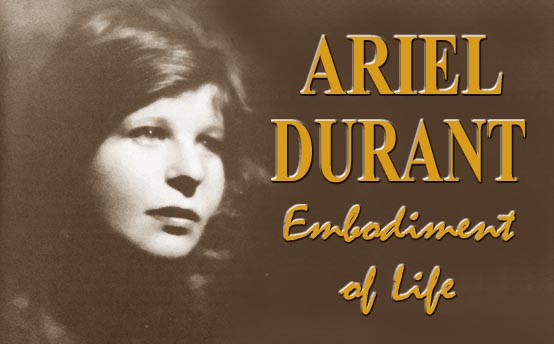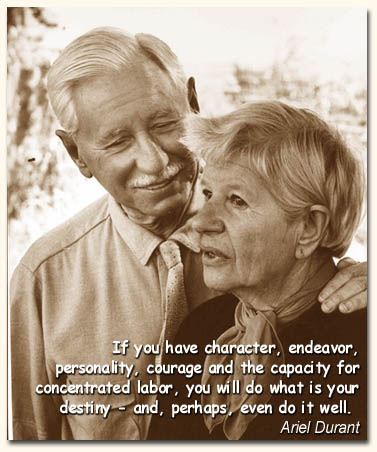



















 .
|

Ariel Durant started as Will Durant’s
student, became his wife and then his equal. A brilliant conversationalist
and sharp debater, Ariel’s intellect blossomed under the
guidance of the man whom she referred to as her "teacher,
lover, mentor and friend," Will Durant.
To Will Durant, she was the embodiment
of life itself; fun loving, controversial, unafraid to speak
her mind (in fact, refusing to do otherwise) and a champion of
women’s rights. Born Chaya, which means "life" (Ida
in English) Kaufman on May 10, 1898 in Proskurov (now Khmelnitski)
Russia to Jewish parents, Chaya immigrated with her mother, three
sisters and older brother to the United States, landing in New
York in November of 1901, Chaya would grow up on the streets
and learn to fight and fend for herself at an early age.
At the age of 13 she discovered the
Ferrer School, which specialized in libertarian education. Not
long after she began attending, a young man by the name of Will
Durant signed on to be a teacher in that institution. He immediately
was attracted to the young student, who reminded him so much
of a sprite that he nicknamed her "Puck." According
to Ariel’s recollection:
Will for years called me
Puck, from one of Shakespeare’s flighty fairies; but in his premature
autobiography, Transition (1927), he rechristened me Ariel,
from another fairy – forgetting that they were both male.
This has become my legal name…
By the time she reached the age of
15, teacher and student had fallen in love. Realizing the potential
problems that would attend such a student-teacher relationship,
Durant resigned his position and spoke to Chaya’s mother
about marriage. Despite some initial misgivings, Mrs. Kaufman
in time gave her consent to the union and accompanied Will Durant
to City Hall to witness the marriage. Chaya herself almost missed
the service, as she had opted to roller skate to the locale and,
to everyone’s relief (and after one or two falls en route)
Chaya arrived at City Hall – out of breath, but ready to
start a new chapter in her life as a married woman.
 The first years of marriage were not easy; Chaya (now
Puck) was still a restless spirit and many was the night she
spent looking at her young husband’s back as he prepared
for his twice weekly lectures – their sole source of income
at that point. During the day, she was left at their home alone
as Will attended College and lectured on philosophy to bring
in money. Puck ran away at least twice during these early years,
but always called for Will to come and pick her up. She preferred
the company of artists and poets to philosophers, but in spending
time with Will she began to understand that philosophy need not
be boring and inconsequential to real-world issues. Soon she
caught the fever herself and began debating her husband on certain
points (both at home and on the lecture platform) and began to
hold her own in the company of such distinguished philosophers
and friends as Bertrand Russell and George Santayana. The first years of marriage were not easy; Chaya (now
Puck) was still a restless spirit and many was the night she
spent looking at her young husband’s back as he prepared
for his twice weekly lectures – their sole source of income
at that point. During the day, she was left at their home alone
as Will attended College and lectured on philosophy to bring
in money. Puck ran away at least twice during these early years,
but always called for Will to come and pick her up. She preferred
the company of artists and poets to philosophers, but in spending
time with Will she began to understand that philosophy need not
be boring and inconsequential to real-world issues. Soon she
caught the fever herself and began debating her husband on certain
points (both at home and on the lecture platform) and began to
hold her own in the company of such distinguished philosophers
and friends as Bertrand Russell and George Santayana.
Durant’s affection increased
ever more for his wife as he witnessed the blossoming of her
intellect. He offered encouragement, support and, in time, grew
to trust her judgment on key points. It was a perfect example
of the Chinese symbol of yin-yang; the pair could not have been
more different and yet they came to rely on their interdependence
for their very existence.
Over time, Puck (now Ariel) began
to contribute more and more to Will Durant’s research and
writing, until, by volume Eight of The Story of Civilization,
she was listed as the co-author. This marked the culmination
of the Durant’s life-long partnership – in marriage,
life and art. Their cooperation was electrical; by Volume Ten,
the pair had been awarded the Pulitzer Prize for literature and
the Medal of Freedom from the United States Government, the highest
award granted by the government to civilians. Ariel was nominated
as "Woman of the Year" by the City of Los Angeles in
1977, her opinions on history, philosophy and social issues such
as woman’s liberation and education being much sought after
by both women and men throughout the world. But the final words
in summing up her life and relationship must belong to Ariel,
transcribed from a recording she made with her husband Will Durant:
Every once in a while I had to go
off and be myself and do my own adventures and I came back
and I met people and we exchanged ideas, and meanwhile I was
growing all the time. When you met me, Will, I was a tabula
rasa, and you knew that it was because I knew nothing that
you could make something of me. And because you knew that I
was good for you; that my adventurous spirit, my energies,
and my desire to know everything; I would fill myself up and
I would bring it to you. You were stationary, you had to sit
all the time; you had to read the words of books, the great
knowledge in the world, and I had to go out and meet people,
gather adventures and bring every kind of personality to you.
I introduced you, didn’t I, to all the artists that were
in Greenwich Village? I brought them to your table – you
never knew with whom you were going to eat, did you? I brought
them all to you from Woodstock. We had great adventures, but
I brought the world to you so that, though you were learning
the world from books, you had not had many adventures because
you were almost like a little monk. From the age of four to
the age of twenty-seven -- when you were excommunicated --
you knew nothing but Church history, Church philosophy and
the word of God, but did you know much about the word of man?
Did you know much about what man was around you, or everywhere
within us? I was the adventure in your life and I brought you
this life, and what did you do for me? You educated me; you
quieted my wild blood. You brought unity and meaning to our
lives so that now, after 59 years of marriage you have toned
me down so that I may be a helpmate to you and I have been
so happy to think that, as I believe in the Woman’s Liberation
Movement, women should go shoulder-to-shoulder with men. I
was so happy the first time that I saw my name with yours in
the books that we were working on together for so many years.
So many years of research and labor and love before we could
see our names united before the whole world as representative
of the unity that a man and woman can achieve and must achieve – and
will achieve all over the world. I believe the time is right
for all that -- with or without a Woman’s Liberation Movement.
If you have character, endeavor, personality, courage and the
capacity for concentrated labor, you will do what is your destiny – and,
perhaps, even do it well. And for so much of the life that
we have lived together, learning, contributing to each other’s
way of life and character and considering the complexity of
the universe, I have so many years of happy memories. And so
much of it I believe I have to thank you for, Will. Not only
all the attractions of a husband and a lover, but the deep
companionship that has developed between us so that we almost
have one breath, one life, one interest.
.
..
|